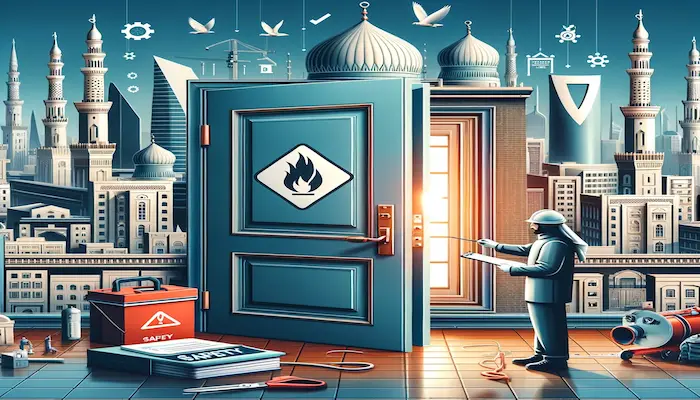In the heart of Riyadh, amidst its sprawling urban landscape, a vital yet often overlooked component plays a crucial role in ensuring the safety and security of its residents and infrastructure: fire-rated doors. These essential elements, a testament to the city’s commitment to safety, require diligent maintenance and inspection to function effectively. This comprehensive guide delves into the practices and standards essential for maintaining fire-rated doors in Riyadh, interwoven with local insights and a narrative that brings the importance of these safety features to life.
The Silent Guardians of Riyadh
Imagine a bustling day in Riyadh, with the sun casting its golden hues over the city’s majestic skyline. Within this vibrant setting, a fire-rated door stands guard in a busy commercial complex, unnoticed by many but silently pivotal in protecting lives and property. This door’s story is one of silent vigilance, preparedness, and the unseen efforts that ensure its readiness in the face of danger.
Essential Maintenance Practices for Fire-Rated Doors
Maintaining fire-rated doors is not just a regulatory requirement; it’s a fundamental aspect of building safety. Here’s how professionals in Riyadh ensure these doors are always at their best:
Regular Visual Inspections
Routine checks are the first line of defense in identifying potential issues. Look for signs of damage, wear and tear, or any alterations that might compromise the door’s integrity. This includes checking for gaps, ensuring seals are intact, and that the door closes properly.
Periodic Professional Inspections
According to Saudi Arabian standards, fire-rated doors must undergo professional inspections at least annually. These inspections should assess all components of the door, including the frame, hinges, door leaf, and closing mechanisms, to ensure they meet the stringent safety requirements set forth by the Saudi Building Code.
Cleaning and Maintenance
Regular cleaning and maintenance of fire-rated doors are crucial. This involves removing any debris that could obstruct the door’s path, ensuring the closing mechanism is unimpeded, and checking that fire and smoke seals are free from damage and securely in place.
Common Pitfalls to Avoid
In Riyadh, where the desert climate can be harsh, certain challenges are unique to the maintenance of fire-rated doors. Avoid these common mistakes:
- Ignoring the buildup of dust and sand, which can interfere with the door’s closing mechanism.
- Using inappropriate lubricants on hinges or locks that may attract more dust or degrade the material.
- Painting over intumescent seals, which can impair their functionality in the event of a fire.
Integrating Arabic Cultural Insights
In Riyadh, the maintenance of fire-rated doors also involves a deep understanding of local customs and construction practices. It’s essential to respect the architectural integrity of each building while ensuring safety standards are met. For instance, in maintaining the doors of historical buildings, one must consider both the aesthetic and cultural significance (الأهمية الثقافية والجمالية) alongside the technical requirements of fire safety.
The Role of Technology in Maintenance
Advancements in technology offer new avenues for maintaining fire-rated doors in Riyadh. From digital inspection checklists to IoT sensors that monitor door status in real-time, leveraging technology can enhance the efficiency and effectiveness of maintenance practices.
Conclusion: A Commitment to Safety
In Riyadh, the story of fire-rated doors is one of unwavering commitment to safety and preparedness. Through diligent maintenance and regular inspections, these silent guardians remain ready to protect the city’s residents and its cherished infrastructure. As we continue to build and grow, let us not forget the vital role these doors play in our collective safety, ensuring that Riyadh remains a beacon of security and resilience in the face of any challenge.
By understanding and implementing these essential maintenance practices, we not only adhere to Saudi Arabian standards but also honor the trust placed in us to safeguard our spaces and the people within them.
